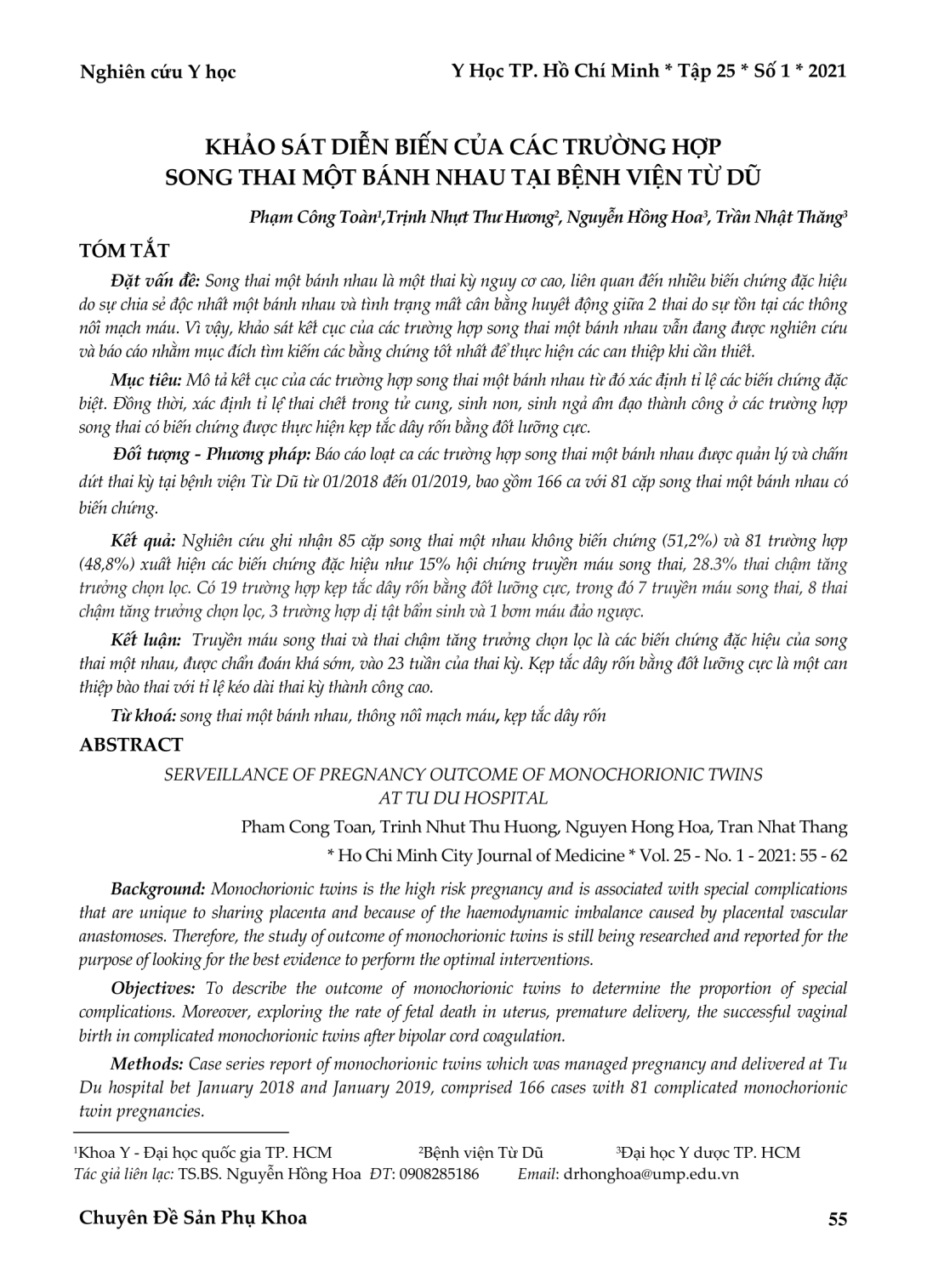
Mô tả kết cục của các trường hợp song thai một bánh nhau từ đó xác định tỉ lệ các biến chứng đặc biệt. Đồng thời, xác định tỉ lệ thai chết trong tử cung, sinh non, sinh ngả âm đạo thành công ở các trường hợp song thai có biến chứng được thực hiện kẹp tắc dây rốn bằng đốt lưỡng cực. Đối tượng - Phương pháp Báo cáo loạt ca các trường hợp song thai một bánh nhau được quản lý và chấm dứt thai kỳ tại bệnh viện Từ Dũ từ 01/2018 đến 01/2019, bao gồm 166 ca với 81 cặp song thai một bánh nhau có biến chứng. Kết quả Nghiên cứu ghi nhận 85 cặp song thai một nhau không biến chứng (51,2%) và 81 trường hợp (48,8%) xuất hiện các biến chứng đặc hiệu như 15% hội chứng truyền máu song thai, 28.3% thai chậm tăng trưởng chọn lọc. Có 19 trường hợp kẹp tắc dây rốn bằng đốt lưỡng cực, trong đó 7 truyền máu song thai, 8 thai chậm tăng trưởng chọn lọc, 3 trường hợp dị tật bẩm sinh và 1 bơm máu đảo ngược. Kết luận Truyền máu song thai và thai chậm tăng trưởng chọn lọc là các biến chứng đặc hiệu của song thai một nhau, được chẩn đoán khá sớm, vào 23 tuần của thai kỳ. Kẹp tắc dây rốn bằng đốt lưỡng cực là một can thiệp bào thai với tỉ lệ kéo dài thai kỳ thành công cao.
Monochorionic twins is the high risk pregnancy and is associated with special complications that are unique to sharing placenta and because of the haemodynamic imbalance caused by placental vascular anastomoses. Therefore, the study of outcome of monochorionic twins is still being researched and reported for the purpose of looking for the best evidence to perform the optimal interventions. Objectives To describe the outcome of monochorionic twins to determine the proportion of special complications. Moreover, exploring the rate of fetal death in uterus, premature delivery, the successful vaginal birth in complicated monochorionic twins after bipolar cord coagulation. Methods Case series report of monochorionic twins which was managed pregnancy and delivered at Tu Du hospital bet January 2018 and January 2019, comprised 166 cases with 81 complicated monochorionic twin pregnancies. Results The series comprised 85 uncomplicated monochorionic twins (51.2%) and 81 complicated cases (48.8%) with 15% twin-twin transfusion syndrome (TTTS) and 28.3% selective intrauterine growth restriction (sIUGR). Nineteen cases of bipolar cord coagulation prefomed included on seven TTTS, eight sIUGR, three cases with serious malformation and one twin reversed arterial perfusion sequence (TRAP). Conclusion TTTS and sIUGR are the complication unique to monochorionic twins and diagnosed in the early stage after 23 week’s gestational. Bipolar cord coagulation is an effective procedure in complcated monochorionic pregnancies to improve pregnancy outcome.
- Đăng nhập để gửi ý kiến
